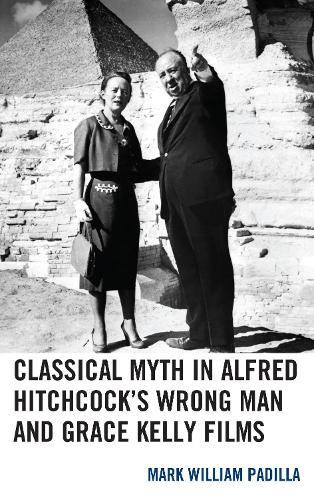
Classical Myth in Alfred Hitchcock's Wrong Man and Grace Kelly Films
(Hardback)
Publishing Details
Classical Myth in Alfred Hitchcock's Wrong Man and Grace Kelly Films
By (Author) Mark William Padilla
Bloomsbury Publishing PLC
Lexington Books
12th December 2018
United States
Classifications
Professional and Scholarly
Non Fiction
Literary studies: ancient, classical and medieval
Individual film directors, film-makers
791.430233092
Physical Properties
Hardback
412
Width 154mm, Height 235mm, Spine 31mm
771g
Description
Mark Padillas classical reception readings of Alfred Hitchcock features some of the directors most loved and important films, and demonstrates how they are informed by the educational and cultural classicism of the directors formative years. The six close readings begin with discussions of the production histories, so as to theorize and clarify how classicism could and did enter the projects. Exploration of the films through a classical lens creates the opportunity to explore new themes and ideological investments. The result is a further appreciation of both the engine of the directors storytelling creativity and the expressionism of classicism, especially Greek myth and art, in British and American modernism. The analysis organizes the material into two triptychs, one focused on the three films sharing a wrong man pattern (wrongly accused man goes on the run to clear himself), the other treating the films starring the actress Grace Kelly. Chapter One, on The 39 Steps (1935), finds the origins of the wrong man plot in early 20th-century British classicism, and demonstrates that the movie utilizes motifs of Homers Odyssey. Chapter Two, on Saboteur (1942), theorizes the impact of the directors memories of the formalism and myths associated with the Parthenon sculptures housed in the British Museum. Chapter Three, on North by Northwest, participates in the myths of the hero Oedipus, as associated with early Greek epic, Freud, Nietzsche, and Sophocles. Chapter Four, on Dial M for Murder (1954), returns to Homers Odyssey in the interpretive use of the lay of Demodocus, a story about the sexual triangle of Hephaestus, Aphrodite, and Ares. Chapter Five, on Rear Window (1954), finds its narrative archetype in The Homeric Hymn to Aphrodite; the erotic theme of Sirius, the Dog Star, also marks the film. Chapter Six, on To Catch a Thief (1955), offers the opportunity to break from mythic analogues, and to consider the films philosophical resonances (Plato and Epicurus) in the context of motifs coalesced around the god Dionysus/Bacchus.
Reviews
The several "prodigious feats" of classicist Mark Padilla in this book more than emulate those of Mr Memory in Alfred Hitchcock's The 39 Steps (1935). Professor Padilla's accomplishment is to have placed six Hitchcock films and their characters in something like a fundamental position in the history of art and narrative. His lens is that of Greek myth and culture, and it works splendidly. The character Richard Hannay (Robert Donat) in The 39 Steps is "both high and low", and we are told exactly why. Lisa Fremont (Grace Kelly) in Rear Window (1954) is successively "self-centered" and "heroic", and Padilla illustrates this by analogues drawn from two separate versions of the Aphrodite/Venus story. Exemplary stuff. Whole courses on the Western-art heritage could be based on Padilla's book. -- Ken Mogg, Author of The Alfred Hitchcock Story
In this welcome follow-up to his Classical Myth in Four Films of Alfred Hitchcock, Padilla continues to demonstrate the profound influence of classical myths and imagery on many of the Master of Suspenses most important works. Classicists and scholars of film and classical receptions alike will appreciate Padillas thorough research, keen insights, and perceptive analysis, which are made accessible to lay audiences - both Hitchcock fans and armchair mythologists - through clear organization, direct prose, and full exposition of the works he discusses. By highlighting the imprint of classical myths, images, and patterns on the seemingly unrelated works of one of the most influential auteur-directors in the history of cinema, Padilla here makes an important contribution to the growing field of Reception Studies. -- Kirsten Day, Augustana College
Author Bio
Mark W. Padilla is distinguished professor of classical studies at Christopher Newport University.
